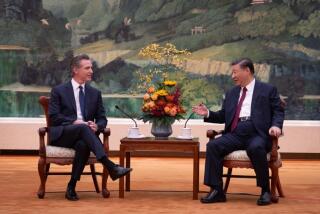Shultz to Criticize China on 2 Journalists
- Share via
ANCHORAGE, Alaska — Secretary of State George P. Shultz departed for a five-day visit to China on Thursday and said he intends to complain to Chinese leaders about the expulsion of two Western journalists.
Shultz said en route to Beijing that he has put the ouster of John F. Burns, a New York Times correspondent, and Lawrence MacDonald, an American citizen employed by the French news agency Agence France-Presse, at the top of his list of concerns about the human rights situation in China.
Asked a general question about China’s crackdown on dissent and “bourgeois liberalism,” Shultz said: “There is a question of the expulsion of journalists--there have been two now.
“That is a matter always of concern to us, given our views on the importance of freedom of the press. I spoke about that when some Chinese journalists called on me the other day in Washington. I’ll speak about that (to his hosts in China). Of course, I’ll be interested to hear what they have to say to me about internal developments in China.”
Hopes to Assess Impact
Shultz talked with reporters on board his plane before it landed here to refuel. In China, he hopes to assess the impact on U.S.-Chinese relations of the ouster of Communist Party chief Hu Yaobang and the political upheaval that has accompanied it.
U.S. officials want to know if Deng Xiaoping, China’s pre-eminent leader since the death of Mao Tse-tung a decade ago, is still in firm control. Hu was a protege of Deng, and his dismissal could signal a decline in Deng’s power.
Shultz made it clear, however, that the prevailing view in Washington is that Deng remains China’s most important official.
According to a report in the Washington Post, Deng has issued new directions to Chinese Communist Party officials telling them they should suppress political dissent and shun American-style democracy. The document seems to indicate that Deng is behind the latest crackdown on students and intellectuals who have demanded a more open political system.
Commenting on the report, Shultz said, “My working assumption is that Deng Xiaoping is the key person and basically, when important things happen, he is in one way or another involved.”
Calls Rights Basic
Deng also was quoted as saying that foreigners are more concerned about Chinese stability than about the country’s human rights record. Shultz signaled a sharp disagreement with that view.
“Our basic view is that what we call human rights is the avenue through which you do get basic stability in a society,” Shultz said. “I don’t see that they are contradictory.”
U.S. officials say privately they are concerned that relations between China and the Soviet Union may be warming after years of bitter hostility in which Beijing and Washington cooperated because of their shared animosity to Moscow. But Shultz said better Sino-Soviet relations might be a good thing for the United States and the rest of the world.
He noted that China has set three conditions on improved relations with the Soviet Union: elimination of concentrations of Soviet troops on the Chinese border, an end to the Soviet military intervention in Afghanistan and an end to the Vietnamese domination of Cambodia.
Removal of those obstacles, Shultz said, “would affect things in a very positive way.”
Rear Guard Action
Shultz responded lightheartedly to a question he has been dodging for a month. Did he, as a Princeton undergraduate, have a tiger tattooed on his buttock?
“I have been investigated,” he said, “by the FBI, the IRS, numerous leak investigations, by the Senate Intelligence Committee, by the Tower Commission, by everybody--I don’t have a secret left in the world. My mail is opened. That is the only thing I’ve got left--what is on my rear end.”
Shultz is to arrive in the Chinese capital Sunday.
More to Read
Sign up for Essential California
The most important California stories and recommendations in your inbox every morning.
You may occasionally receive promotional content from the Los Angeles Times.










